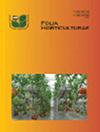Mathematical modelling of Hass avocado firmness by using destructive and non-destructive devices at different maturity stages and under two storage conditions
IF 2.2
4区 农林科学
Q2 HORTICULTURE
引用次数: 2
Abstract
Abstract Devices which are used to determine firmness of non-destructive nature do not penetrate the skin or damage the underlying flesh of the fruit and do provide real-time results, avoid raw biomass loss and allow the testing of every individual fruit and repeated testing of the same fruit, thus providing many advantages for researchers and the industry alike. Contrarily, destructive methods puncture the fruit and thus only a subsample, selected to represent all fruit, can be tested. In addition, different operators can generate quite different values for the same fruit using a hand-held penetrometer. Hass avocado from two commercial orchards was collected, and fruit firmness was measured at harvest, during two storage conditions controlled atmosphere (CA) and regular air (RA), during shelf-life and at the ready-to-eat stage using both destructive (Fruit Pressure Tester, mod. FT327, Wagner Instruments, Greenwich, USA) and non-destructive devices (Model TA.XT plusC, Stable Micro Systems Ltd, England). Then, the mathematical relationship between these two devices was assessed using Spearman Correlation coefficient (rho) and p-values adjusted by Benjamini-Hochberg and Bonferroni procedures. Thus, 3,200 fruits were evaluated during two harvests and two subsequent seasons. A moderate and positive association between destructive and non-destructive devices was found (rho coefficient ranging from 0.41 to 0.51). The variance explained by the regression models ranged from 0.53 to 0.63; all of them were significant with good accuracies (i.e., 0.79; 0.78; 0.73; 0.76). The results prompt us to conclude that a non-destructive texture analyser device can be used to accurately predict firmness measured by a penetrometer in Hass avocado fruit and contribute to avoiding fruit discards.在不同成熟阶段和两种储存条件下,使用破坏性和非破坏性装置对哈斯鳄梨硬度进行数学建模
用于确定非破坏性性质的硬度的设备不会穿透皮肤或损坏水果的底层果肉,并且提供实时结果,避免原始生物量损失,并允许对每个水果进行测试和重复测试,从而为研究人员和行业提供了许多优势。相反,破坏性方法刺穿水果,因此只有一个子样本,选择代表所有水果,可以测试。此外,不同的操作人员可以使用手持式穿透仪对同一种水果产生完全不同的值。采集了两个商业果园的哈斯鳄梨,并在收获时、受控大气(CA)和常规空气(RA)两种储存条件下、保质期内和即食阶段使用破坏性(fruit Pressure Tester, mod. FT327, Wagner Instruments, Greenwich, USA)和非破坏性装置(Model TA)测量了果实的硬度。XT plusC, Stable Micro Systems Ltd,英国)。然后,使用Spearman相关系数(rho)和benjamin - hochberg和Bonferroni程序调整的p值来评估这两个设备之间的数学关系。因此,在两次收获和随后的两个季节对3,200种水果进行了评估。破坏性和非破坏性装置之间存在适度的正相关(rho系数范围为0.41至0.51)。回归模型解释的方差范围为0.53 ~ 0.63;它们都是显著的,具有良好的准确性(即0.79;0.78;0.73;0.76)。结果提示我们得出结论,非破坏性质地分析仪装置可以准确地预测哈斯鳄梨果实的硬度,并有助于避免水果丢弃。
本文章由计算机程序翻译,如有差异,请以英文原文为准。
求助全文
约1分钟内获得全文
求助全文
来源期刊

Folia Horticulturae
Agricultural and Biological Sciences-Horticulture
CiteScore
3.40
自引率
0.00%
发文量
13
审稿时长
16 weeks
期刊介绍:
Folia Horticulturae is an international, scientific journal published in English. It covers a broad research spectrum of aspects related to horticultural science that are of interest to a wide scientific community and have an impact on progress in both basic and applied research carried out with the use of horticultural crops and their products. The journal’s aim is to disseminate recent findings and serve as a forum for presenting views as well as for discussing important problems and prospects of modern horticulture, particularly in relation to sustainable production of high yield and quality of horticultural products, including their impact on human health.
 求助内容:
求助内容: 应助结果提醒方式:
应助结果提醒方式:


